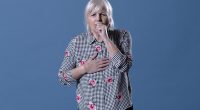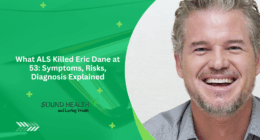Modern Family star Julie Bowen has shared a deeply personal health revelation—one she’s carried quietly for over two decades. At just 29 years old, Bowen was diagnosed with a rare cardiac condition known as sick sinus syndrome, a disorder that disrupts the heart’s natural rhythm. Now 54, the Emmy-winning actress is shedding light on the early warning signs, the importance of paying attention to your body, and how her sister’s insight may have saved her life. The sitcom star recently appeared on the Inside of You with Michael Rosenbaum podcast, where she talked about her family and living with a heart condition.

What Is Sick Sinus Syndrome?
Sick sinus syndrome (SSS) is a group of heart rhythm disorders that affect the sinoatrial (SA) node—the heart’s natural pacemaker. This node is responsible for initiating each heartbeat, regulating the rate and rhythm. When it malfunctions, the result can be a heartbeat that’s too slow, too fast, or erratically alternating between the two. The syndrome is relatively rare, especially in young adults, and is more commonly diagnosed in individuals over the age of 50. However, as Julie Bowen’s experience illustrates, it can manifest earlier—especially when symptoms are subtle and easily mistaken for stress or fatigue.
In Bowen’s case, her symptoms included frequent lightheadedness and dizzy spells, which she initially brushed off. It wasn’t until her sister—a medical professional—connected the dots and urged her to get evaluated that she discovered the seriousness of her condition.
Julie Bowen’s Journey: From Dizziness to Diagnosis
Before the diagnosis, Bowen’s symptoms were easy to dismiss. She had been feeling lightheaded during simple daily activities. At first, she attributed it to exhaustion, dehydration, or anxiety. As an up-and-coming actress navigating the pressures of Hollywood, stress seemed a plausible explanation.
But her sister, who was in medical school at the time, noticed a pattern in Julie’s symptoms during a family visit. Her clinical instincts kicked in, prompting her to suggest a full cardiac evaluation. That advice led Julie to a cardiologist who diagnosed her with sick sinus syndrome after an electrocardiogram revealed irregularities in her heart rhythm.
Within a short time, doctors determined that a pacemaker was necessary to manage the condition. At just 29, Julie Bowen underwent surgery to have the device implanted—an experience she now credits with saving her life.
What Are the Symptoms of Sick Sinus Syndrome?
One of the challenges of diagnosing SSS is that its symptoms can mimic other conditions or appear sporadically. Some people go years without a diagnosis, attributing the signs to aging or stress.
Common symptoms include:
- Lightheadedness or frequent dizziness
- Fainting spells (syncope)
- Fatigue during physical activity
- Palpitations or irregular heartbeat
- Chest pain or discomfort
- Shortness of breath
- Confusion or memory issues, particularly in older adults
Not all patients experience every symptom, and in many cases, the signs fluctuate in severity. For Julie Bowen, it was primarily unexplained lightheadedness that signaled something was wrong.
Understanding the Heart’s Rhythm: Bradycardia and Beyond
In the context of sick sinus syndrome, rhythm disturbances can take several forms. One common pattern is bradycardia, where the heart beats abnormally slow. For adults, a heart rate below 60 beats per minute at rest may be considered too slow, particularly if it causes symptoms. Bowen likely experienced bradycardia during her episodes of lightheadedness, where insufficient blood flow to the brain triggered the sensation.
Another manifestation is sinus pause, where the heart temporarily stops beating for a few seconds. These pauses can be intermittent, occurring sporadically without warning. Alternatively, the heart can alternate between tachycardia (fast heartbeat) and bradycardia, leading to unpredictable symptoms that make daily life challenging.
For people unfamiliar with cardiac health, these issues often go unnoticed until a serious event occurs. Bowen’s openness helps educate others on the importance of recognizing subtle symptoms and acting quickly.
The Role of Pacemakers in Managing Heart Rhythm Disorders
A pacemaker is a small, battery-operated device implanted in the chest to help regulate abnormal heart rhythms. It delivers electrical impulses to the heart muscle, ensuring the heart beats at a consistent rate. In patients with sick sinus syndrome, the pacemaker compensates for the faulty signals from the SA node.
Julie Bowen’s decision to get a pacemaker at 29 was medically necessary and life-changing. Though it was an unexpected turn in her young life, the device allowed her to continue pursuing her acting career, raise a family, and live without the debilitating symptoms that had plagued her prior to diagnosis.
Today, pacemakers are highly advanced and minimally invasive. They typically last between 8 to 15 years and allow individuals to live full, active lives. In fact, studies show that patients with SSS who receive a pacemaker have significantly improved outcomes and quality of life.
Julie Bowen’s Message: Listen to Your Body and Your Loved Ones
Julie Bowen’s story is a powerful reminder that no one is immune to serious health conditions, regardless of age or physical appearance. Her transparency serves not only to break down stigmas but also to encourage others—especially women—to trust their instincts and speak up when something feels off.
She credits her sister for noticing the signs and pushing her to seek help, emphasizing the importance of family support and medical vigilance. Many women, especially in their 20s and 30s, may dismiss cardiac symptoms as anxiety or fatigue. Bowen’s journey shows how early intervention can prevent more serious complications down the road.
When to Seek Medical Advice
If you or someone you know experiences the following symptoms consistently, a medical consultation is critical:
- Persistent or recurring dizziness
- Episodes of fainting or feeling about to faint
- Unexplained fatigue that interferes with daily tasks
- Noticeable fluctuations in heartbeat
- Chest discomfort without a clear cause
Cardiac rhythm issues often require specialized testing such as ECGs, Holter monitors, or stress tests to pinpoint the underlying problem.
Final Thoughts
Julie Bowen’s public disclosure about her heart condition offers both inspiration and a public health message. She may be known for her quick wit and on-screen charisma, but behind the scenes, she’s navigated a serious health journey with resilience and grace.
As more celebrities speak openly about chronic or hidden medical conditions, the stigma surrounding them continues to fade. By sharing her experience with sick sinus syndrome and how it led to a pacemaker at age 29, Bowen helps educate, empower, and potentially save lives—especially among young women who may not associate heart issues with their age group.
Her story is a reminder: The heart, although strong and resilient, still needs attention—and sometimes, a little electrical help to keep beating just right.
Also Read | How Water Helps Lower Blood Sugar, Backed by Science







